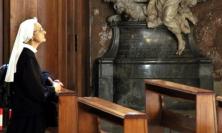How was Ignatius of Loyola able to find God in all things? It was because he fell – and stayed – in love with God; and through the gift of the Spiritual Exercises, he helps us to do the same! Sr Jane Livesey, the General Superior of the Congregation of Jesus, celebrates the Feast of St Ignatius by thinking about how he loved Jesus and was inspired to ‘live the present with passion’, just as Pope Francis urges all those in consecrated life to do.
When Pope Francis adjured consecrated people of all kinds to ‘live the present with passion’ in his Apostolic Letter to them of November 2014 inaugurating the current Year of Consecrated Life[i], he might well have had the founder of his own Jesuit order in mind as a pretty good exemplar of the practice.
Later in the same section of that letter, the pope challenges his readers with the following question: ‘Is Jesus really our first and only love, as we promised he would be when we professed our vows?’ Because, he goes on to say: ‘Only if he is, will we be empowered to love, in truth and mercy, every person who crosses our path. For we will have learned from Jesus the meaning and practice of love. We will be able to love because we have his own heart.’
At a day for religious that I took part in recently, it was observed by some of those attending that, as English people, they were not very comfortable with the idea of living the present – or, indeed, anything else! – with passion. Be that as it may, it seems pretty clear that anyone who wants to get to know and understand Ignatius of Loyola better has little choice but to accept that this was a man who lived with passion, fought (literally) with passion, and over time grew to love (God) with passion. This passion spurred him to want to serve that God and Lord, whom he had initially grown to love through the biographies of saints that he devoured whilst recuperating from a knee wound sustained at the battle of Pamplona (having eschewed his earlier preferred reading matter of the 16th century Spanish equivalent of Mills and Boon). And yet, enamoured and admiring though he was of Francis, Dominic and others as a result of that reading, it does not seem to have occurred to him to join either of their, or any other already-existing, religious orders. The idea of religious life, let alone founding an order, does not seem to have been part of his thinking until he was well along the path of his own spiritual journey – and even then possibly more at the behest of others, his first companions, than through any direct inspiration in his own heart and soul.
Instead, being a man who seems never to have been introduced to the concept of doing things by halves, he threw himself into a personal regime of prayer and penance. This was a means both of proving to God and to himself that he was serious about changing his life, and of seeking to establish what it was that God wanted from him in his life. Those who know the life of Ignatius[ii] will know that there followed several key ‘staging posts’ on his journey from long and dirty hair and nails in Manresa to the camerette (his rooms) beside the church of the Gesù in Rome, where he spent so many years writing his Constitutions and thousands of letters to his own members and to others. (A small digression – if you love St Ignatius and are ever in Rome, take time away from the usual pilgrim and tourist destinations to go to the camerette and just be there in company with St Ignatius.[iii] You will not regret it!)
By far the most important of those ‘staging posts’ was, of course, the Spiritual Exercises, born of Ignatius’s personal encounters with the God with whom he had fallen in love. In the Exercises, Ignatius hit on the idea of the meeting of sacred scripture with the scripture of a person’s own life, mediated through imaginative contemplation of the scripture and a personal entry into the scenes of Our Lord’s life. Through that encounter, which from his own experience he knew to have the potential to be life-changing, a person can be given the grace to strive to be more filled with the love of God, whilst, paradoxically growing in his/her understanding of the nature of that love as a completely free and unconditional gift of God. In the Spiritual Exercises we grow in intimacy with ‘God our Lord’ through meeting him in the scripture, through allowing his gaze to fall on us as it fell on all those whom he encountered in his public life and through returning that gaze of love steadfastly and without feeling the need to gabble in His presence.
There is a lovely quotation, attributed to St Augustine, which says that, ‘The sacred scriptures are our letters from home’. They certainly were for St Ignatius. And what do we do when we get letters from home (however that is now defined in our digital age)? We take them somewhere quiet so we can be by ourselves and concentrate on what is written; we settle down and we read them, and then we read them again and again – because we know that they are tangible evidence that we are thought about, that we are cared for, that through them we are being gazed upon with love. But we only come to know that through attentiveness and listening, via our insertion into the scenes of the scripture, to what the Person with the loving gaze wants to say to us.
At the same time, in the Exercises themselves and in Ignatian prayer in general, most notably in the examen, there is that other strand of our contemplation – the invitation to gaze lovingly but honestly, in the presence of the loving gaze of God, on the scripture of my own life. What has the word of God been in my life and what has been my response to that word of God? I bring that response before the Lord of the road to Emmaus, so that He can make some sense of it for me and, through doing so, enable me to go back on the road and continue to play my part in building His Kingdom through my words but, more importantly, through my life, with that explicitly Ignatian characteristic of ‘finding God in all things’.
The day-to-day tool for this ‘finding God in all things’ is what Ignatius calls discreta caritas – discerning love. It is a love that has its origins in our faith that God loved us first but it should be our fundamental and default disposition to want to return that love. It is not by chance that the Spiritual Exercises, Ignatius’s gift to his first companions, to his members and to all seeking to find God in all things, ends with the Contemplation for Attaining Divine Love. The Note at the beginning of what is commonly called the ‘Contemplatio’ is a typically realistic observation:
First, it is well to remark two things: the first is that love ought to be put more in deeds than in words. The second, love consists in interchange between the two parties: that is to say in the lover’s giving and communicating to the beloved what he has or out of what he has or can; and so, on the contrary the beloved to the lover. [iv]
That is the caritas. The discreta (discerning/discriminating) qualifies the caritas, not in terms of its generosity – which we should always be striving to make more and more unqualified – but in terms of learning to discern/discriminate those interior dispositions that draw me away from that love that is ‘put more in deeds than words’ and that prevent me from giving what I have or can to ‘the beloved’, whether God himself directly or ‘every person who crosses [my] path’ (see earlier quotation from Pope Francis). In our own time, our growing understanding of the integrity of creation and our relationship to it, expounded so beautifully and convincingly in Laudato si’, adds another dimension to the meaning of discreta caritas. Interestingly, Ignatius was ahead of the game in that area, as the remainder of the ‘Contemplatio’[v] makes clear, with its frequent mention of the gifts of God in creation and the gratitude that our consideration of them should elicit.
The ‘Contemplatio’ – and the dispositions it puts before us – is the culmination of the Spiritual Exercises. It is no accident that Ignatius ends with love, because that is where he began all those years ago on his convalescent bed in Loyola. In typing that last sentence, the words of T. S. Eliot in the Four Quartets have come into my mind: ‘…the end of all our exploring will be to arrive where we started and know the place for the first time’. Ignatius’s whole life was an exploration of the love of God and of how best to respond to that love. In the ‘Contemplatio’ he did arrive where he had first started and in it he closed the circle between Manresa and the camerette.
I began this article with the pope’s question about falling in love, which is, of course, precisely what Ignatius did, spending the rest of his life living out the consequences of that falling in love. The legacy of these consequences is the Spiritual Exercises and, for those in the Society of Jesus and other Ignatian religious congregations, his Constitutions. I would like to end with the words of another man, an echt son of St Ignatius, who also lived the present with passion – not least when that passion, at the end of his life, involved a very real living out of the Passion of his Lord: Pedro Arrupe, the General Superior of the Society of Jesus who was elected 50 years ago and served in that mission until his resignation in 1983. These words are the key to understanding Fr Arrupe but I suggest that they are also the key to understanding Ignatius:
Nothing is more practical than finding God:
that is, than falling in love in a quite absolute way.
What you are in love with, what seizes your imagination, will affect everything.
It will decide what will get you out of bed in the morning,
what you do with your evenings, how you spend your weekend,
what you read, who you know, what breaks your heart,
and what amazes you with joy and gratitude.
Fall in love, stay in love, and it will decide everything.
And for Ignatius it certainly did decide everything. It was that falling in love with God, and staying in love with him, that were key to being able to find Him in all things and to trying, on a daily basis, through prayer and discreta caritas to seek and do His will, both for himself and for his ‘least Society’. And as for him, so for us…
Sister Jane Livesey is General Superior of the Congregation of Jesus, a congregation founded by the Englishwoman Mary Ward on the model of the Society of Jesus, whose Constitutions it adopted in 2002, approximately 400 years after Mary Ward first petitioned the Church to be allowed to do so. The Congregation is present in 23 countries around the world.
Try Ignatian Spirituality!
The Jesuits in Britain offer plenty of opportunities for you to experience Ignatian spirituality. You can:
- Make the First Week of the Spiritual Exercises, or make another Ignatian retreat at St Beuno’s Jesuit Spirituality Centre in North Wales. Find out more >>
- Pray every day with a 10-13 minute prayer session from Pray as you go, and use their other resources. Listen >>
- Learn about and try Ignatian ways of praying, and find out about other resources and opportunities, on the website of the Jesuits in Britain. Visit the website >>
[i] Apostolic Letter of His Holiness Pope Francis to all Consecrated People on the occasion of the Year of Consecrated Life, November 2014, §I.2
[ii] Those who don’t might like to read more on the website of the Jesuits in Britain: http://www.jesuit.org.uk/ignatius-loyola-0
[iii] You can watch a video tour of Ignatius’s rooms at: https://youtu.be/QvGO9ZiHMQw
[iv] Spiritual Exercises §230
[v] Sp Exx §231-237






